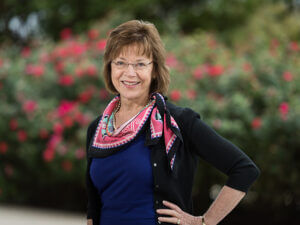
When Janice Massey, M.D., graduated from ACU in 1968, becoming a neurology professor was the last thing on her mind. Today, she is a recognized pioneer in the field and a trailblazer at Duke University School of Medicine, where she holds the distinction of being the university’s first female professor of neurology.
Janice began her career as a high school math teacher expecting to later become a stay-home mom. But she had been intrigued by a genetics seminar class during her last semester at ACU. After her husband, Wayne, completed medical school and with his encouragement, she decided to pursue her interest in graduate school at the University of Texas Medical Branch at Galveston.
She was introduced to the field of neurobiology, a subject she found fascinating. That interest soon led her to apply to medical school at Georgetown University, which led to a specialization in neurology, an uncommon career path for women at that time.
In the more than 30 years since, she has made significant contributions to her field. Janice performs clinical research and treats patients with rare neuromuscular diseases. She also teaches and mentors young physicians, especially women interested in academic neurology.
Career of distinction
She has served on many national boards and as president of several neurologic groups. In 2013, she was named Myasthenia Gravis Foundation Association Doctor of the Year and also presented with the Clinician of the Year award by the American Association of Electrodiagnostic and Neuromuscular Medicine. She received the Duke Distinguished Medical Alumna Award in 2015.
Along with her husband, she was honored with the dedication of a conference room in the Duke Neurology Department in April 2016. The conference room was named the Janice M. and E. Wayne Massey Conference Room to honor the couple’s longstanding work in neurology at Duke. “I think it’s particularly special because it’s the two of us, recognizing our roles individually and also as a couple,” Massey said.
Although working in the same specialty, each have made unique contributions. Wayne directed the Duke Rehabilitation unit for 25 years and focuses on general neurology. Janice was founding chair of the Neuromuscular Division and implemented new insights in treatment for the autoimmune disease myasthenia gravis and for cervical dystonia.
Passion and perseverance
Throughout their first 17 years of marriage, at least one of the Masseys was in training. Janice taught high school math while her husband attended medical school at the University of Texas Medical Branch in Galveston. After a year at Ohio State while her husband interned, the couple returned to Galveston for his residency and so she could attend graduate school. “We didn’t even consider starting a family until that training was completed,” she said.
Wayne was drafted late in the Vietnam War, so Janice attended medical school at Georgetown University while her husband served at Bethesda Naval Hospital. Some nights both would be on call at different hospitals. “Training was intense; we had no limits on our work hours,” she recalled.
At the time Janice finished medical school, few universities were accepting of couples, particularly for a faculty position and a resident in training. Things fell into place when the couple found positions at Duke University. After completing fellowship training in 1983, Janice became Duke Medical Center’s first female neurology faculty member and later the first female professor of neurology.
Janice mentors several junior faculty members in the neuromuscular division, and she promotes national leadership for women. She expresses her passion for neuroscience both with patients and in research. “Neurology is so neat because as a neurologist we can do so much at the bedside to identify the patient’s diagnosis, often at the first encounter,” she said.
She said she loves being intellectually challenged and given the opportunity make a positive change someone’s life. Research by Janice and her colleagues has changed the treatment standards for myasthenia gravis and Lambert-Eaton syndrome worldwide. Early in her career, she pioneered the use of botulinum toxins to treat cervical dystonia and other focal dystonias.
“Having God in my life has provided me strength to be there for people,” Janice said. “It helps me recognize the need to care about others.”
Not only have the Masseys impacted the field of neuroscience and educational programs at Duke, they have also impacted the ACU community by serving as members of the ACU Board of Trustees in the past. Together they walk in faithfulness and leadership.
– Robin Saylor
Feb. 27, 2021
